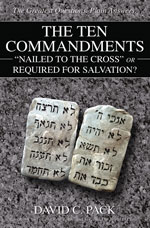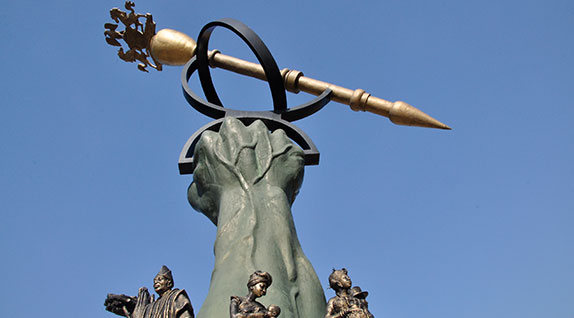 Salasi D. Jezhi/The Real Truth
Salasi D. Jezhi/The Real Truth
Article
Despite having enormous potential, the nation has struggled for decades to overcome challenges and take its place as a powerhouse on the world stage.
Learn the why behind the headlines.
Subscribe to the Real Truth for FREE news and analysis.
Subscribe NowAs a born and bred Nigerian, I am well-acquainted with my country’s dubious global brand. The “giant of Africa” often is reduced to a land of fraudsters and heartless online scammers who dupe people out of their life savings.
Beyond this stereotype and the accompanying jokes, the nation, named
These are just two of the many scurrilous claims to fame for my place of birth.
It reminds me of what Chimamanda Ngozi Adichie, an award-winning Nigerian author, stated in the lecture “The Danger of a Single Story.” She said that “to create a single story, show a people as one thing, as only one thing, over and over again and that is what they become.” The unfavorable narratives placed on my native land regrettably have shaped the world’s view of it.
Nigeria, like every modern nation, is a mix of good, bad and sometimes very ugly. During my 27-year legal career, I lived mostly in the north. This occupation, however, allowed me to travel the length and breadth of the country, which is more than twice the size of the American state of California.
Yes, I have witnessed firsthand the nation’s crime,
This says nothing of Nigeria’s 186 million inhabitants who, despite the nation’s challenges, are happy. Happiness is considered one of the best things about Nigeria. This is easy to see when one walks down its winding streets. The people are lively and always seem to smile, displaying energy and enthusiasm. The 2015 and 2016 World Happiness Report ranked Nigerians 2nd and 6th, respectively, in Africa.
One label certainly does not tell the whole story.
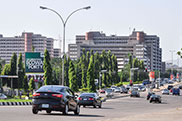 Salasi D. Jezhi/The Real Truth
Salasi D. Jezhi/The Real Truth Yet, as one who has long been intrigued by the history,
The 1959 Nigerian short film “Giant in the Sun” introduced Africa as the “continent of the future.” The film predicted that it would be led by a self-governed Nigeria, as it would become a former colony of Great Britain the following year. The movie, highly acclaimed at the time, demonstrated how Nigeria distinguished itself as a leader in industrial, agricultural, commercial and social development.
Sadly, the tremendous advancements
Nigeria remains an enigma. This “sleeping giant in the sun” is yet to awaken and find its place among the powers of the world.
“Great” Resources
The title “giant of Africa” is fitting for Nigeria. Though not the oldest or geographically largest country on the continent, the coastal nation nonetheless stands out—mostly for its high economic status and enormous population.
Nigeria’s robust economy (the world’s 26th largest GDP in 2016) is based on an extensive list of agricultural resources and industries including: cocoa, peanuts, cotton, palm oil, corn, rice, sorghum, millet, cassava (manioc, tapioca), yams, rubber, cattle, sheep, goats, pigs, timber, fish, coal, tin, coltan, rubber products, wood, hides and skins, textiles, cement and other construction materials, food products, footwear, chemicals, fertilizers, printing, ceramics and steel (CIA World Factbook).
Yet nearly all of Nigeria’s wealth is based on its abundant oil reserves. Petroleum and petroleum products have been the primary source of income and government revenue for more than 40 years. The world’s increased dependence on crude oil has made Nigeria the 13th largest producer of oil in the world and the top in Africa.
This reality, incidentally, has caused the nation’s other viable industries to suffer. Merchants pour their resources into the oil business seeking the best return on investment. This leaves the nation’s economy vulnerable due to volatile world oil prices.
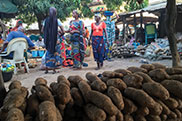 Salasi D. Jezhi/The Real Truth
Salasi D. Jezhi/The Real Truth The economy is not the only “giant” thing in my homeland. Nigeria is easily Africa’s most populous nation at over 186 million—nearly twice the size of Africa’s second largest—and the 7th most populous nation in the world.
As with many African nations, Nigeria is in the midst of a baby boom. It has the 12th highest birthrate in the world. (The United States is ranked 159 by comparison.) The nation is also among the world’s youngest with a median age of 18.3 years (the U.S. is 37.9 by comparison). With a young and already large population, it is estimated that by 2050, Nigeria will be the world’s fourth most populated nation at 392 million.
Abundant resources,
Exceptional People
Nigerians are among the most capable and educated people in the world. Nearly every family, especially in the southern part of the country, has college-degree holders or professionals. The country boasts qualified specialists in virtually every field of human endeavor. Many qualified Nigerian professionals (lawyers, doctors, nurses, engineers, architects and more) fill positions around the globe where more opportunities are available.
The Migration Policy Institute, an independent, nonprofit organization dedicated to the movement of people worldwide, released a June 2015 report on the immigration of Nigerians to the United States. It listed Nigerians as the “largest source of African immigration” to the U.S. It stated that the “Nigerian diaspora is the best educated” of the groups studied and that a “far greater share of the Nigerian first and second generation earned undergraduate degrees than the U.S. population overall (37 percent versus 20 percent).” The study also found that Nigerians were “more than twice as likely to have secured an advanced degree (29 percent versus 11 percent).”
Per the institute, “Members of the Nigerian diaspora are also substantially more likely than the general U.S. population to be in the labor force and to work in professional or managerial occupations.”
Please understand, I do not bring all this up to prove some sort of vast superiority of my countrymen. Yes, I have seen them generally excel at whatever they apply themselves. They are a capable people who have access to abundant resources and are steadily increasing.
But the nation remains embroiled in problems. So what is holding it back?
Divergent Rationales
Despite working mostly in the northern part of the country, I was born in the western area and grew up in the east. This has given me a wide perspective. Though united as Nigerians—my people are not all the same.
For instance, there are more than 250 ethnic nationalities over the nation’s 36 states and federal capital. Many of these groups have different cultural practices,
More facts to consider. The nation’s three largest ethnic groups are the Hausa-Fulani who live mainly in the north, the Igbo in the southeast, and Yoruba in the southwest. They are known domestically as “the big three.” Each reflects an assortment of traditions and governance.
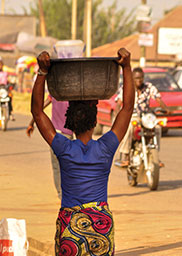 Salasi D. Jezhi/The Real Truth
Salasi D. Jezhi/The Real Truth Disparity of living: A lady carries water in a plastic basin for domestic use. Most suburban houses are not connected to running water, therefore residents must purchase water daily from wells (Oct. 30, 2016).
The Hausa-Fulani are more feudal in nature. They rely on a hereditary monarchy for their governmental system, meaning leaders are selected along bloodlines. Many in this ethnic group adhere to Islam—as do 50 percent of all Nigerians. Most Muslims occupy the northern area of the country.
Southern Nigeria, which hosts the Yoruba and Igbo, is more westernized and urban. The south is also where most Christians dwell. They make up 40 percent of the nation, with the remaining 10 percent of citizens holding to indigenous beliefs. The Yoruba, like the Hausa-Fulani, look to bloodlines for the selection of its leaders while the Igbo are mostly republic in nature, with leaders or elders chosen by the people.
Nigerians adhere to traditional practices in an ever-changing and contemporary world. For instance, all its ethnic nationalities are patrilineal, which means that children belong to the man and any inheritance is strictly from the father. Also, polygamy is traditionally practiced by almost all ethnic groups.
These differences lead to a series of competing allegiances and ways of life. Yet the ultimate conflict of interest may be in the world of religion.
Nigerians are typically very religious. Federal and state governments heavily promote religious pilgrimages and prayers are given openly at state functions, in schools, and at public gatherings. It is common to hear Nigerians invoke God’s name in practically every given situation. In the face of economic hardship, deprivation, unwarranted suffering, or blatant political oppression and repression, the typical Nigerian will just say, “I leave it to God.”
But religion is not helping the nation work out its problems. Instead of spurring tighter bonds, it has brought intense division between Muslims and Christians—both claiming to fight in the name of their god. Attacks from Islamic Boko Haram are at times met with some form of response from radical Christian groups. Adherents from radical Muslim groups burn places of worship of more moderate Muslims and Christians. They also attack villages populated by the opposing side’s followers.
The medley of beliefs and culture would affect any nation’s ability to pull toward a common goal.
Culture of Corruption
Pervasive religion in Nigeria seems to have no effect on rampant corruption, however. It is everywhere. As soon you land in Nigeria, the immigration officer will likely shuffle through your documents and ask what you have for him. In other words, “settle me” and have an easy passage.
If you are bold enough to say you brought nothing, he will likely more blatantly ask you to drop some dollars, pounds or euros “for the boys.” If you are still unwilling to pay, then brace yourself for a long wait as your baggage will be subjected to intense and rigorous scrutiny—all because you refused to “play ball.”
By the time you wade through this and start driving to your destination, a policeman at a highway checkpoint with a gun slung across his shoulders will utter the same words, “Settle me.” Thus, the cycle starts again.
I personally remember many years ago, going to the Department of Inland Revenue to be assessed for taxes. The young tax officer asked why I would want to pay money to the government when—for a small sum—he could get me my tax clearance certificate “in a jiffy.” Because I turned him down, it took a much longer time before the certificate was given to me.
Corruption is so widespread that there are outlets such as the nonprofit website BribeNigeria.com dedicated to empowering Nigerian citizens to report bribery and hold culprits accountable.
Political Instability
Unsurprisingly, rampant corruption has led to political instability. This has been a problem for decades.
Notice the motivation for a military coup on January 15, 1966. The uprising’s leader stated in a broadcast about his goals on Radio Kaduna: “Our enemies are the political profiteers, the swindlers, the men in high and low places that seek bribes and demand 10 percent; those that seek to keep the country divided permanently so that they can remain in office as ministers or VIPs at least…those that have corrupted our society and put the Nigerian political calendar back by their words and deeds.”
Continued corruption by the political class led to another military coup in July 1966. About 10 months later, the eastern portion of Nigeria attempted to secede from the rest of the nation by declaring itself the Republic of Biafra. This led to the Nigerian federal government launching a full-scale civil war that raged for 30 months.
I remember as a young 9-year-old boy fleeing from invading Nigerian troops in November 1969. I spent Christmas that year hiding in a forest with nowhere else to go after armed men invaded my grandmother’s village. We fed on raw cassava roots and leaves and other wild herbs for weeks and dared not light a fire to cook a meal. I will never forget the boom of heavy mortar and artillery fire as fighting raged around us.
On January 15, 1970—my father turned on his small battery-powered radio. Shortly after, I heard him scream at the top of his voice, “The war is over!” followed by similar shouts from all parts of the forest. Soon people streamed out of their hiding places and spontaneously burst into songs of thanksgiving. They cried and hugged each other with joy at having survived the grueling 30-month war.
In total, the conflict took over one million lives and left several additional millions displaced.
Since that time, though, the nation has continued to struggle with corruption and multiple regime changes, much of it by
All these have also negatively contributed to the single story of Nigeria.
Way Forward
Though quick to call on “God,” Nigerians demonstrate, as my late father would say, “a form of religion without genuine godliness.” What did he mean?
Though many Nigerians are certainly sincere in their view toward God and religion—something seems missing. My father’s observation reflects a Bible verse in II Timothy 3:5.
In a detailed description of attitudes prevalent in our modern time, Paul explained to Timothy that some would be seen as “having a form of godliness, but denying the power thereof…” These people would have a “form” or appearance of “godliness,” of being religious, but would be unable to fully experience the benefits. They would somehow “deny” or reject the “power” or miraculous force or ability available through the true and living God.
How could something like this happen?
One form of God’s power is His words—the Holy Scriptures. For instance, Hebrews 4:12 describes it as follows: “For the word of God is quick, and powerful, and sharper than any two-edged sword, piercing even to the dividing asunder of soul and spirit, and of the joints and marrow, and is a discerner of the thoughts and intents of the heart.”
People can, unwittingly or otherwise, deny the power of God by not obeying Him—His words. One wonders, how many pious Muslims or firebrand Christians in my country have read and considered such counsel?
Nigerians, however, are by no means alone in this way. Most people on the planet struggle with this concept.
The God of the Bible wants everyone, not just Nigerians, to go beyond acknowledging His supremacy with mere words. He wants action in the form of obeying His commands.
God’s true people are known by their obedience. It is how His children express love to Him and others. Notice: “By
The connection between knowing God and obedience is even stronger earlier in the book. Notice: “And hereby we do know that we know
These are powerful words!
Obedience requires humility—a willingness to put aside one’s own will and come under the authority of another. Humility combined with the knowledge that comes from studying God’s Word results in a desire and ability to turn from sin, which is the transgression of God’s holy, righteous and perfect Law (I John 3:4).
In exchange for this commitment from human beings, whether individually or collectively as a nation, is the promise that almighty God will hear their pleas from His throne in heaven, forgive their transgressions, and attend to their needs (II Chron. 7:14). This most powerful promise comes from the Being who cannot lie (Num. 23:19).
My countrymen and women must be ready to obey every word of God in accordance with Isaiah 1:19, which says, “If you be willing and obedient, you shall eat the good of the land.”
God is not interested in those who only mouth their love for Him. He wants to see people genuinely repent and obey Him.
It is only then that things will begin to turn around. It is then—and only then—that the single-story narrative that has defined places like my dear country will disappear.
Yet change starts at the individual level. It then eventually spreads to the family, to the neighborhood, to the city, to the nation, then finally to the world.
To begin to take steps toward real change, order David C. Pack’s book, The Ten Commandments – “Nailed to the Cross” or Required for Salvation? The book explains in detail what God requires for those who are seeking to obey Him.
The “sleeping giant in the sun” can awaken from the abyss of gloom and despair. It can combine the abundant resources and abilities of its people—if it turns and obeys God.
This will give it a foretaste of the peace and prosperity that will come in the very near future, not only to Nigeria but to the entire world.
To understand more about this time, watch The World to Come broadcast, “How God’s Kingdom Will Come—Not What You Think!”
More on Related Topics:
- In a Nigerian Village, Extremists Issued a Call to Prayer and Then Slaughtered Those Who Turned Up
- Sudanese Paramilitary Force Abducting Children in Darfur, Witnesses Say
- Nigeria’s Northeast Faces Worst Hunger in a Decade as Aid Cuts Hit Region, UN Says
- Uganda Shuts Down Internet Ahead of Election, Orders Rights Groups to Halt Work
- Sudan’s Top General Rejects U.S.-Led Ceasefire Proposal, Calling It ‘The Worst Yet’

